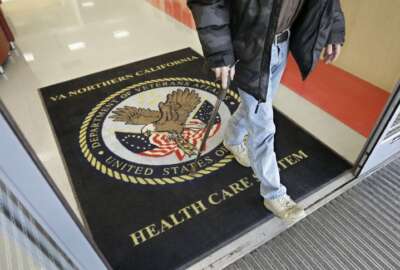Hubbard Radio Washington DC, LLC. All rights reserved. This website is not intended for users located within the European Economic Area.
Government Accountability Office finds policy lapses that hinder VA’s ability to respond to complaints
An audit by the Government Accountability Office found some policy and procedural lapses that hinder VA's ability to respond to complaints.
Best listening experience is on Chrome, Firefox or Safari. Subscribe to Federal Drive’s daily audio interviews on Apple Podcasts or PodcastOne.
Some 9,000 aging veterans live in nursing homes operated by the Veterans Health Administration. The VA calls them community living centers. Sometimes complaints arise from residents or their advocates. An audit by the Government Accountability Office found some policy and procedural lapses that hinder VA’s ability to respond to complaints. For more, the GAO’s Director of Health Care Issues, Sharon Silas spoke with the Federal Drive with Tom Temin.
Tom Temin: Ms. Silas, good to have you back.
Sharon Silas: Thanks for having me, Tom.
Tom Temin: And I guess people maybe didn’t know that VA actually operates its own nursing home. So tell us about these community care centers where they fit in the whole context of VA.
Sharon Silas: Sure, so community living centers are kind of a unique type of nursing home because they’re owned and operated by VA. And oftentimes, these community living centers are located within the VA medical centers themselves. So community living centers often have to follow the national community living center policy that VA has in place, but they also have to follow some of the policies that the VA Medical Center has in place.
Tom Temin: All right, and complaints are the issue of what it is that you looked at. And complaints, again, come from residents themselves, if they’re able to make the complaints or from their advocates or families, I imagine. And is the problem that the complaints aren’t acted on and corrected, or that VHA doesn’t track them, and make sure that they’re administratively known to VHA so they can maybe look at trends and so forth?
Sharon Silas: It gets a little bit of both. Complaints are an important tool in overseeing care concerns, especially with the nursing home residents. Complaints are an opportunity to investigate concerns in the short term and maybe address them immediately. It’s also an opportunity for VA staff to identify quality care concerns that may not be captured in other oversight efforts that they use, such as annual inspections. And being able to address complaints in the short term immediately is especially important for some of the more serious concerns such as allegations of abuse, for example, but what we found, we made five recommendations to VA that cover basically three categories of deficiencies that we identify. The first was insufficient policies, most of the complaints we found are addressed at the community living center level, and those are not required to be documented. And there’s an opportunity for complaints to be elevated to the patient advocate for the VA Medical Center. But we found that most complaints aren’t elevated to the patient advocate system. So a lot of these complaints are not being captured, the VA is not able to ensure that the complaints are being investigated and resolved, and ensuring that whatever the circumstances were don’t occur again.
The other area that we had findings was that we found that there was limited monitoring how VA ensures that community living center staff are following the policy. So in our report, we have a number of examples demonstrating that community living center staff were not properly adhering to the existing policies. So they weren’t filing complaints in a timely manner. They weren’t properly documenting them, as I mentioned previously. And then if these complaints are making it into the patient advocate system, for example, there’s not really a way to monitor those complaints specific for the community living centers, because there’s no way to separate out those from the VA Medical Center complaints.
And the last category of findings that we had has to do with unclear guidance. And we found this in two areas. The first is that the guidance for community living center staff on when to elevate the most serious complaints to VA leadership, the language and the guidance isn’t very clear. And we actually took a look through six of our sites that we included in our review, we went and identified 19 serious complaints, only one had actually been elevated to VA leadership and so there is some indication that there’s some underreporting going on there. The other area that we found issues with unclear guidance was just the guidance that’s provided to veterans, residents and their families, about how to file complaint and what to expect during the complaint process.
Tom Temin: We’re speaking with Sharon Silas director of health care issues at the Government Accountability Office. So they had some serious complaints, but they weren’t known then to upper management. And so that would seem to impede VHA’s ability to spot trends. I mean, for example, if the same center, people complain about a wet floor, well, then you’ve got some kind of maintenance issue, that’s probably easier fixed. But on the other hand, if they relate to abuse or say something unsanitary, then you may have a more serious problem. You would think VHA would want to know about it.
Sharon Silas: Yes, that’s correct. We looked at complaints from 2000 — I’m not going to say the year, Tom, and I just don’t know what the scope of the work was. But I will say this that when we looked at the complaints, complaints ranged from kind of one end of the spectrum on the low end where it could be residents preferences for accommodations or the types of meals they would like. And then on the other end of the spectrum, it’s kind of more high risk complaints where there could be allegations of abuse. And as I mentioned, we did find issues of where there’s indications that there might be underreporting, because the guidance for community living center staff as to when they should be elevating that to VA leadership to do some of that trending and monitoring wasn’t happening.
Tom Temin: In other words, then they need clearer policies, and then they have to make sure that people adhere to those policies. And that seems to be the tough one. Because if a complaint happens, say, at night, when the supervisory staff may not be there, how do you prove a negative that someone has not reported something that should be. I imagine that’s a sticky wicket.
Sharon Silas: Yeah, at the community living center level, there is no requirement for complaints to even be documented. So unless those complaints are elevated to the patient advocate at the VA Medical Center, they’re not getting fed into a centralized system to do that monitoring. And in fact, one of the sites that we included in our report, one of the officials told us that they estimated about 90% of their complaints are handled within the community living center themselves, they don’t reach the patient advocate level.
Tom Temin: Right. And so you’re saying that probably they should, even if they’re resolved correctly, someone has to maintain the database to know what’s going on trend wise?
Sharon Silas: Sure. And in our recommendations, we recommended that VA either develop a system or use the patient advocate system that already exists, to try to track some of these complaints and be able to monitor them because that was one of the other findings was that if the complaints made it into the patient advocate system, there isn’t a really good way to separate them out from the other complaints from the VA Medical Center.
Tom Temin: And how did VHA staff react to the report? Do they generally agree that they need to tighten up these, again, policies and procedures?
Sharon Silas: Yes, they concurred with all five of our recommendations.
Tom Temin: And in looking at this, maybe this is outside the scope, and if you can’t answer it, I’ll understand. But did you get the sense that the care is generally good at these places?
Sharon Silas: Yeah, Tom, I know, we have another report that we just issued too, that talks about more generally about oversight of quality of care. I can say that VA is taking a number of steps to try to improve their oversight and training around quality care issues with community living center staff. But this complaints process was somewhere where we found a number of deficiencies, and VA is really kind of missing out on what could be a powerful tool to oversee quality care.
Tom Temin: And by the way, the residents, the 9,000, roughly nationwide in these centers, are they mostly elderly, because sometimes nursing homes have people that are not of the age you would expect to be in a nursing home, but they have other issues that require them to be in nursing homes. So are there some younger veterans with serious problems?
Sharon Silas: Yeah, I think generally, you’re talking about an elderly population. But I do believe there are some veterans that are residing in these community living centers that may not be elderly. Community living centers are just one of three types of nursing home care that the VA provides to veterans, and community living centers often are used for short stays and for some of the more serious care issues for veterans. Veterans can also be residing in community nursing homes and in state veterans homes.
Tom Temin: Sharon Silas is director of health care issues at the Government Accountability Office. Thanks so much.
Sharon Silas: Thanks, Tom.
Copyright © 2024 Federal News Network. All rights reserved. This website is not intended for users located within the European Economic Area.
Tom Temin
Tom Temin is host of the Federal Drive and has been providing insight on federal technology and management issues for more than 30 years.
Follow @tteminWFED





